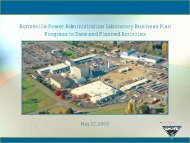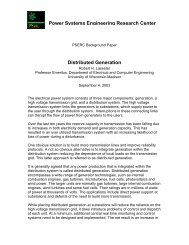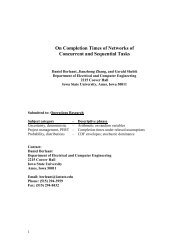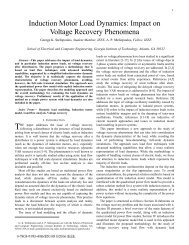Thrive: The Skills Imperative - Power Systems Engineering ...
Thrive: The Skills Imperative - Power Systems Engineering ...
Thrive: The Skills Imperative - Power Systems Engineering ...
Create successful ePaper yourself
Turn your PDF publications into a flip-book with our unique Google optimized e-Paper software.
15<br />
Looming Shortfalls<br />
Demand for these types of skills will only grow during<br />
the next decade with the retirements of current<br />
workers. For example:<br />
Maintenance Workers<br />
For every 10 workers who retire, there are only<br />
three to seven to replace them, creating a shortage<br />
of skilled men and women who are trained to keep<br />
complex machines operating. 16<br />
Auto Mechanics<br />
<strong>The</strong> Bureau of Labor Statistics forecasts that auto<br />
repair shops nationwide face an annual shortage of<br />
about 35,000 auto technicians through 2010. 17<br />
Welders<br />
According to the American Welding Society and<br />
other industry research, average welders are in their<br />
mid-fifties, with many approaching 60 years old.<br />
Estimates suggest that more than half of the industry’s<br />
highly trained workforce is nearing retirement,<br />
creating a potential shortage of more than 200,000<br />
skilled welders by 2010. 18<br />
Electric <strong>Power</strong> Workforce<br />
<strong>The</strong> average age of the power workforce is nearing<br />
50—half of the country’s 412,000 power workers<br />
are expected to retire in the next 10 years. A 2004<br />
Edison Electric Institute survey shows that approximately<br />
20 percent of the electric transmission workforce<br />
is expected to retire in the next five years. 19<br />
<strong>The</strong> society that scorns excellence in plumbing<br />
because plumbing is a humble activity, and<br />
tolerates shoddiness in philosophy because<br />
philosophy is an exalted activity, will have neither<br />
good plumbing nor good philosophy. Neither<br />
its pipes nor its theories will hold water.<br />
John Gardner, former Health, Education and Welfare Secretary<br />
<strong>The</strong> importance of these technology workers to the<br />
economy is growing in lock step with the sophistication—and<br />
fragility—of today’s technology-based<br />
civilization. Increasingly, these jobs demand a capability<br />
to work with complex tools and systems. Technology<br />
workers need to be astute and anticipatory—<br />
able to spot problems and prevent potential failures.<br />
<strong>The</strong>y need to be experienced and empowered, able<br />
to leverage their knowledge to propose improvements<br />
and even innovations. <strong>The</strong>y keep the technical<br />
infrastructure of the nation humming.<br />
Bottom Line<br />
Many of these jobs pay well, often well above the<br />
national average. 20 <strong>The</strong> time has come to stop<br />
thinking of them as blue collar, and start thinking<br />
of the people as technology workers. <strong>The</strong>se positions<br />
create solid career opportunities for millions<br />
of Americans. Community colleges must become<br />
an integral partner in expanding the technology<br />
workforce. And the nation must put a high priority<br />
on ensuring public-private partnerships to fund<br />
adequate training programs for what are likely to<br />
emerge as critical shortages.
















